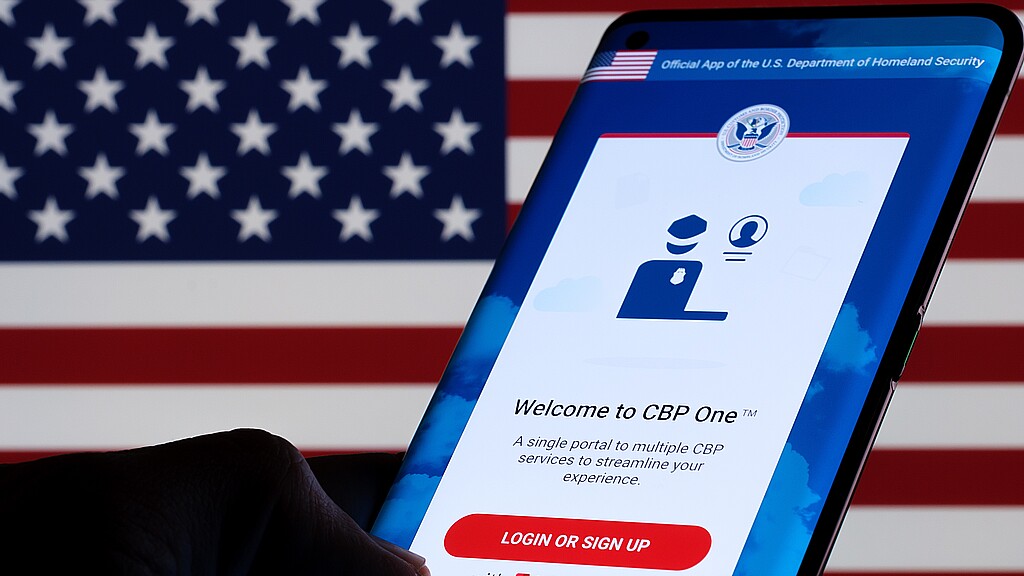Technology
U.S. denies Mexican drug cartels are selling screening appointments to migrants by hacking CBP One app
The cartels have been advertising and selling a service that provides them migrants with an internet connection through a virtual private network (VPN) so that the app cannot tell if the person is in northern Mexico

December 31, 2023 7:07pm
Updated: December 31, 2023 11:32pm
Customs and Border Protection is denying a recent report that the new CBP One Mobile Application that enables traveling migrants to schedule screening appointments at U.S. ports of entry has been hacked and misused by Mexican drug cartels to help their smuggling operations.
The shocking Dec. 30 report, published by The Washington Examiner asserts that the cartels have been selling a service that provides migrants with an internet connection through a virtual private network (VPN) so the DHS app cannot tell if the person is in northern Mexico.
The Examiner’s story comes about a year after a Feb. 7, 2023 ADN investigation, which reported that overseas companies were selling fraudulent travel packages on social media purporting to relocate migrants throughout Latin America, including flight service from Caribbean islands such as Cuba and Haiti all the way to the U.S. border.
ADN found several companies online offering comprehensive travel packages that include mobilization throughout the Latin American region to the southwest border along with U.S. sponsors and legal advice about how to fill out asylum applications.
The cartels purported interference in the mobile app, however, could result in an actual increase in migration flow since the Mexican government is allowing migrants who enter their country from their southern border to continue traveling to the U.S. border when they have scheduled an appointment on the app, according to the Examiner.
Cartels have been selling a service that provides them migrants with an internet connection through a virtual private network (VPN) so the DHS app cannot tell if the person is in northern Mexico.
By manipulating virtual private networks (VPN), the cartels can make appointments for anyone in the world without the usual restrictions of northern Mexico’s geofence, which only allows access to those physically approaching the southern U.S. border.
Smugglers have been advertising and promoting the VPN manipulation service on social media.
The VPNs may be one of the reasons that border encounters began spiking since May and increased by 30% in July, according to a Washington Post report.
A Washington Examiner review of advertisements on social media and unclassified DHS communications revealed that the Mexican government's National Immigration Institute (NMI) told its immigration officials this summer to reject all non-Mexican citizens without a CBP appointment.
Knowing the criteria for INM passage at the Guatemala-Mexico border, the cartels began manipulating the app to make appointments for any paying migrant hoping to enter the North American country.
“Mexico will certainly let people through if they have an appointment, they're sort of counting that as a de facto transit visa,” said Washington Office for Latin America (WOLA) defense director Adam Isacson “It's sabotage and they know very well that people can't normally get an appointment unless they're north of Mexico City.”
Josh Trevino, chief of intelligence and research for the Texas Public Policy Foundation think tank affirmed Isacson’s assertion, telling the Examiner that the cartels are profiting and possibly even paying kickbacks to Mexican officials.
“The Mexican requirement is a cash cow. It's a cash grab,” said Trevino. “The Mexicans — they're not really partners, they're neighbors.”
The cartels have profit billions of dollars each month smuggling drugs and migrants across the border, charging a range of $3,000 to $50,000.
Since the Biden administration launched the CBP One app in January, migrants south of Mexico City had little reason to believe they could find legal way to get into the U.S. if they crossed illegally.
While the app initially created hurdles for cartels, it is now helping them charge immigrants more money than before since with the virtual appointments, they can essentially guaranteed entry into the U.S.
“This is a classic example of why the tactical solutions ultimately don't work because there's constantly workarounds to them,” Trevino told the Examiner.
Between Jan. 12, 2023, and Sept. 30, 2023, more than 278,431 appointments were scheduled through the app, with roughly 95.8% of those individuals securing parole into the United States.
After the Washington Examiner’s story was published a CBP spokeswoman denied the claim, saying that the mobile app had not been hacked.
"Claims that the CBP One app has been hacked are categorically false,” Erin Waters in a statement. “Criminal organizations and smugglers continue to prey on vulnerable migrants, lying to them and putting them in harm’s way. Here is the reality: The lawful and orderly pathways we have established have been bad for cartels and other criminal organizations seeking to exploit migrants.
"Importantly, the CBP One app requires a user’s device location services and GPS data to verify their location before booking and confirming an appointment," she added.
Waters said CBP was “continually monitoring and evaluating the application to ensure its functionality and guard against bad actors.”
Isacson told the Examiner that “CBP could fix this if they wanted by just having the app read the GPS reading on the phone and not the location of the server that it's connected to.”
Rep. Mark E. Green, Chairman of the House Committee on Homeland Security told the Examiner in August that the mobile app was being exploited by the cartels as a means ot smuggling more people across the border.
“The Biden administration has continuously shown violent cartels that they may operate as they please at our Southwest border," the Tennessee congressman said in a statement.
“As I warned earlier this year, the cause of this humanitarian crisis is simple: migrants tested the system, called home, and millions came once they received confirmation of Secretary Mayorkas’ catch-and-release practices. According to this week’s bombshell report, drug cartels have seized on the newest iteration. This is further proof that the Biden administration’s use of the CBP One app is reckless and made a mockery of our homeland security—plain and simple.”








